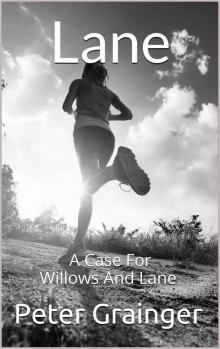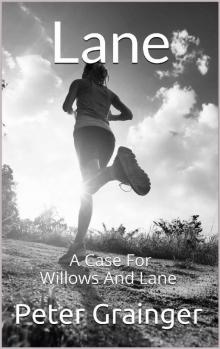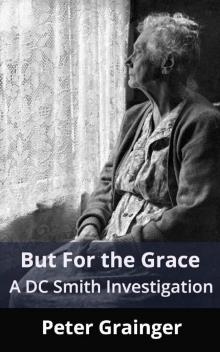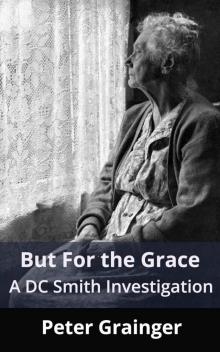- Home
- Peter Grainger
But For The Grace Page 10
But For The Grace Read online
Page 10
In the silence that followed, Smith rubbed a finger across his chin and wondered how long it would be before Maggie asked the question that he knew both of them were considering. The answer was about five seconds.
“In what way was she generous, Kipras?”
He stumbled a little over his answer, his English suddenly seeming to deteriorate.
“She was very kind to everyone. Helpful to everyone. Not mean like some… Very kind.”
They let him go, and then Smith went out to fetch coffee. They would need it. There was, finally, something to talk about.
Despite his heartfelt desire not to interview Mrs Reed any more than absolutely necessary, Smith knew that she was right about at least one thing – the importance of routine in any institution. For the elderly, it probably took on a particular significance. He even thought briefly about his own habits these days before focusing on what Kipras had just told them. Any deviation from the norm was worth exploring, and there seemed to be some here. First, Mrs Riley had gone to bed earlier than usual, and at that point Maggie had corrected him; Mrs Riley had gone into her room, alone, earlier than seemed usual but she had not gone to bed. The people with whom various witnesses had said she invariably socialized had left her alone that evening – they would need to ask about that.
Second, she had been found sitting in her favourite chair but it was not in its usual place in the room. Maggie told him about her own father and the importance of ‘the chair’; as the world of the aged shrinks, the items that remain within it take on greater and greater value. ‘The chair’ becomes the tiny territory from which what remains of our lives is viewed, an eyrie, a lonely crag… Smith gave her a quizzical look and said that he would not write that down but that it was very poetic.
Third, the chair itself had been placed in front of the window that looked out at the golf course with its greens and trees, and at the large, wooded gardens beyond. They spent several minutes discussing the possible significance of this. Some elderly people do spend their days looking out of windows but it seemed that Joan Riley had not been one of those; she had been quite sociable, with a circle of friends, someone who enjoyed contact and communication. And yet, on this particular Saturday, she had sat and, presumably, gazed out of the window as she died.
“Taking her last look at the world?” Smith had ventured.
“That makes a sort of sense to me.”
“From a chair that she could not have moved herself, according to Kipras.”
The two of them sat in silence for a moment, picturing the scene before Maggie spoke again.
“But he didn’t tell us everything, did he?”
“No.”
Another short silence. Smith picked up the notebook and read back through what he had written before continuing.
“When we asked if there was anything else, anything at all, he answered quickly, as if he’d made up his mind beforehand – as if there was something he had decided not to mention. And?”
“When we asked him to explain ‘generous’, he was uncomfortable.”
“He knew he’d made a mistake, Maggie. Bad choice of word. I’m guessing that there are all sorts of rules about it.”
“Bound to be. But was it money? How could it be when Rita Sanchez can account for every chocolate bar? Another thing - could you describe your lounge any better than he described her room, bearing in mind it was a month since he last saw it?”
Smith nodded, which meant in this case, no, he could not.
“Either he has the old eidetic memory and could describe everyone’s room like that or he spent a bit of time with Joan, a bit more time than he has accounted for so far. Long chats about geography and European history? A pity she didn’t get to meet Waters.”
“We need to have a look at him, DC.”
Smith said that they would get the other half of the team to check with Lake Community College about the evening classes, and on Kazlauskas’ immigration status. Nothing had come back on criminal records, so that needed chasing – was it blank or not yet checked? He had lived in Lake long enough and was young enough to know where to buy the illegal things that these days were needed to make the weekends go with a bang. Maggie asked about mentioning him to the Radvilas as Smith was now in the habit of taking tea with them but he said no – he didn’t want Kipras hearing that they were looking at him that thoroughly, just in case.
“Mrs Reed mentioned ‘professional distance’, didn’t she? Was that some sort of criticism, of staff who don’t maintain it?”
Smith closed the notebook, signalling that it was a day for an early lunch.
“I expect that some people find it easier than others. I expect that it’s not a problem at all for Mrs Reed… I think that Kipras and Joan were good friends. It’s a thin line, isn’t it, in a place like this. If your dad was in here, what would you want? Someone to show him friendship, to take an interest? Or professional distance? But you’re right. We need to have a closer look at Mr Kazlauskas.”
They went back to the station to eat in the canteen; Smith regularly made a point of doing this and encouraged others to do the same so that the b’s couldn’t close it down. John Murray and Waters joined them, and the conversation was, inevitably, mostly about the case. Both men asked good questions, and Smith took another spur-of-the-moment decision – the four of them would go up to the incident room and talk it over properly. If that meant not interviewing again until tomorrow, so be it.
They had the staff files with them. Waters was able to scan and then enlarge images of the four people that they had interviewed so far. Smith moved one of the battered old display boards away from the wall and pinned the grainy pictures to it in a row. At the top he wrote ‘The Staff’ and underneath each picture the name of the person and their role at Rosemary House. He had spent enough hours himself stuck in offices supporting others out in the field – this way the support staff would feel more involved and, most importantly, they would produce better results.
Waters plainly thought that the display was rather quaint. He asked Smith whether he had ever used Powerpoint and an OHP. Smith answered that as he didn’t have much power any more, what would be the point?
They stared at the pictures in silence. The conversation which had been lively around the lunch table had died away but Smith knew that eventually something would spark it off again. Ideas do not come to order – if anything, in his experience, it works the other way around.
Murray said that they had completed the criminal record checks that morning. These four people had nothing between them save for a speeding offence – Irene Miller, two years ago. Smith asked for the details. She had driven back a little too quickly from a meeting in Birmingham, having received a phone call about a crisis at the home; the case had been contested, hence the information in the file, but the magistrate had ruled against her. Smith shrugged.
“I don’t have much to compare it to but I think she does a decent job. The paperwork is solid, and you reckon there’s nothing in the inspections that we need to worry about. We know it isn’t easy to get good care staff but the ones we’ve met have been sound enough. The security isn’t great but you have to weigh that against giving families and friends access – you don’t want it to feel like you’re visiting someone in the A wing at the Scrubs…”
Then they talked more about Kipras Kazlauskas and decided that he would be the focus for the support team next. Murray told Waters what he knew about checking immigration status, and Waters pointed out that he had already done that for the Subic family. Smith did not intervene; they knew enough between them and would soon fill in the gaps. Waters wondered whether the lady who had helped them recently at the community college would be able to do so again, and Smith nodded knowingly before saying, “It might depend on whether you sent her the flowers and chocolates like I told you to. It’s amazing how often the same people crop up when you need intelligence.”
Maggie was putting forward ideas about the best kind of chocolates t
o send in those situations when DI Reeve entered the room. They all sat down again, and Smith took her through the investigation so far. She listened and said very little until he was finished.
“Two questions.”
“Fire away, ma’am.”
Pause.
“It’s not murder, is it? Please do not tell me it’s a murder.”
“At this stage I’d say it probably is… Not anything as straightforward as a murder.”
“Two – have you interviewed Assistant Chief Constable Devine’s mother yet?”
“No.”
“Do you intend to do that?”
“Not if we can possibly avoid it, ma’am.”
Another pause.
“Good. Another update tomorrow, please, and I’m here if you need me to do anything. I haven’t been out of my office all bloody week. Goodnight.”
The altered shape of the day meant that it took Smith only a matter of minutes to write up his notes. No pleasant female company, just for a change, he told himself, meant that this really was an evening off. He had cooked for himself a version of the rigatoni he had enjoyed along with some chicken, and now he was contemplating a glass of the twelve-year-old malt that his sister Elaine had sent him for Christmas. The decision was not in doubt but the contemplation was an important part of the enjoyment – there is a little zen even in the drinking of whiskey.
It was also time to listen to Rory again, after the talking about Belfast. He took down the triple CD box set ‘Let’s Go To Work’, a title that said everything about the man, and selected from it the Irish Tour of 1974. The sound system had been their shared luxury, and every time the drawer slid smoothly, invitingly open he thought about her and the never-ending, good natured arguments about what should be played next in the long evenings together.
He was no more than three minutes into ‘Cradle Rock’ when the telephone rang.
“Good evening. Is that Mr Smith?”
“No.”
“It isn’t Mr David Smith?”
“No, my walls are insulated, as is my loft. No, I have never been sold payment protection insurance. No, my car and house are comprehensively covered. No, there is nothing wrong with my computer, Windows was functioning normally the last time I looked. No, thank you.”
“And no, I’m not selling anything, Mr Smith.”
“Oh – it’s a survey then, that will nevertheless end in a no-obligation quotation. The answer is still no.”
“My name is Jo Evison, Mr Smith.”
The piece of paper was still in his pocket – he took it out to be doubly sure.
“May I ask how you got my number?”
“I looked you up.”
“I’m ex-directory.”
“I didn’t say where I looked you up.”
He paused, a little annoyed because she had managed to interest him after all.
“What can I do for you, Ms Evison?”
“I don’t want to keep you on the phone, Mr Smith. I’m sure you haven’t been in long - I know what the job is like. I just wanted to introduce myself.”
A nice voice – on the low side for a woman, and quite unruffled by all his nonsense. He knew better than to try and guess her age, though.
“Well, consider it done. Do you do anything else apart from phone up and introduce yourself?”
“I’m a writer.”
“Oh dear. Have you tried a support group? You can find them for anything now. Nice to talk to you.”
“I’m not a journalist, Mr Smith.”
“They never are, to begin with.”
“I am not, never have been and never will be a journalist.”
“Well, this is a funny way for a novelist to behave.”
She laughed, and he found himself guessing, despite himself – thirties, forties?
“I really don’t want to take up your evening. Can I send you something to look at?”
“Is it a photograph? I think you already know what I do for a job, so…”
“It’s a book – one of my books.”
“Very generous of you. Why would you want to do that?”
“Because I’m planning to write another one.”
“What about?”
“Your most famous case.”
Chapter Nine
They had discussed with Irene Miller where it would be best to interview the residents of Rosemary House. She had said that they should offer them a choice – her office or their own room. Then Smith and Maggie had debated the order in which they should speak to them; in the end Smith agreed to alphabetically by surname, having realized that that would lead to them interviewing Ralph Greenwood last.
Nancy Bishop chose to come to the office. She was a small, rotund and nervous-looking woman; it was at first impossible to say whether this was her normal condition or whether word of what the police were doing here had begun to travel around the home. After a couple of false starts and awkward hesitations, Maggie asked her what she used to do when she was at work.
“I was a nurse, my dear.”
“Really? Here at Kings Lake General?”
“No. Abu Dhabi, amongst various other places around the world. But mostly in the Middle East.”
Her husband had been in the oil industry, and she had followed him on his travels. She never needed to work because of the money he earned – she did so because she would have been bored otherwise and because she enjoyed what she had been trained to do. They had no children and she had held some senior positions in different hospitals, in the days when nurses were nurses and doctors were doctors. Smith had asked her what she meant by that.
“The lines were clearer and if you ask me that was a healthy thing. The doctors diagnosed and the nurses cared. Now they train nurses in universities, they take endless exams and end up with degrees. I was on a ward on my first day! I expect they do six months theory before they empty a bedpan now.”
“It’s just the same in the police service, Mrs Bishop.”
“Without the bedpans, I presume.”
“Well, you’d be surprised, some of the messes we have to clear up!”
She gave a small, squeaky laugh and Smith asked her if she would like a cup of tea. Maggie went to fetch one and Smith chatted to Nancy Bishop about her life in warm, exotic places. Outside he could see the sky was snow-grey again; the whole country was waiting for it to fall heavily as the forecasters were predicting it must.
Over their cups of tea, they moved on to the business in hand. Yes, Joan had been a good friend during their time together in Rosemary House – almost two years. They met every day and often visited each other’s rooms, as well as usually having meals together and enjoying the music and television in the day room.
Smith said, “Is that what the staff call the social area, the large room at the end of the corridor?”
It was. Maggie said that the staff had already told them about the regular group, the Famous Five who sat there together every day, but Nancy Bishop’s reaction was not what they might have expected.
“The staff told you, did they? Well, I don’t suppose they are so bothered now it’s just the three of us.”
“Bothered, Mrs Bishop?”
“You may call me Nancy.”
“Bothered, Nancy?”
“They didn’t always approve. They tried to break us up, make us socialize with the rest, but we never shut anyone out. Anyone could sit down with us, and if they chose not to, that was their problem, Ralph used to say. Mrs Reed did her damndest but she didn’t get anywhere!”
For a moment there was the glint of battle in her eye.
Maggie said, “We spoke to Mr Kazlauskas. He seemed to know Joan very well – he never mentioned any problems.”
“Oh, Kip is different to the rest. We made him an honorary member!”
They asked her about the last Saturday afternoon that Joan was alive. The four of them had sat at their usual table in the day room. Joan was the only one to have had a visit that day, from her daughter and
son-in-law in the morning – they came most Saturdays. She had talked more than usual about her daughter and her grandchildren but everything else was perfectly normal. They had discussed the news in the papers, with Ralph reading out things for them to complain about, the world being what it is today. They had afternoon tea together at four o’clock and went off to their rooms as they usually did. Joan had said she was tired but when you are getting on for eighty, that’s perfectly normal too, isn’t it?
“And you didn’t see Joan again, Nancy?”
“No, I’m sorry to say that I didn’t.”
“What did you do that evening?”
She blinked once or twice and frowned as if trying to recall.
“I stayed in my room.”
“So your group didn’t get together on Saturday evenings? Have a bit of a party?”
She managed only a half-smile at his joke.
“Sometimes we did – but not that Saturday.”
Smith stopped the interview there, so unexpectedly that even Maggie looked surprised. Nancy Bishop seemed to hang back a little as if she had more to say or as if she would like the chance to answer the last question a little differently but Smith simply escorted her to the door and asked if she would able to find her own way back to the floor. As she left, he said that they might want to speak to her again.
“What just happened, DC?”
He was at the window, arms behind his back, one hand holding the opposing wrist, standing, Maggie realized, at ease in the military fashion. She had seen him do it many times but only now understood its significance.
“I wanted her to leave with the feeling that she might have made a mistake.”
Behind him, still seated, Maggie pulled a momentary face of surprise and sipped at the last of the tea, which had grown cold.
“I always imagined you’d be kind to little old ladies.”
If he thought about her remark, he never showed it. He was somewhere else now and all she could do was wait.
“If someone I’m interviewing tells me it was ‘perfectly normal’, on a good day I’ll just assume they were being careless with language. I say careless because nothing ever is perfect or normal. But if they tell me it was ‘perfectly normal’ twice in a minute, I start to assume that it isn’t carelessness. Someone who does that is just too anxious to convey that there is nothing for me to worry about. That’s when I start to worry.”

 Persons of Interest
Persons of Interest A Private Investigation
A Private Investigation Songbird
Songbird On Eden Street
On Eden Street An Accidental Death
An Accidental Death Time and Tide
Time and Tide An Accidental Death: A DC Smith Investigation
An Accidental Death: A DC Smith Investigation In This Bright Future
In This Bright Future Lane: A Case For Willows And Lane
Lane: A Case For Willows And Lane The Rags of Time: A DC Smith Investigation
The Rags of Time: A DC Smith Investigation Luck and Judgement
Luck and Judgement Persons of Interest: A DC Smith Investigation
Persons of Interest: A DC Smith Investigation Lane
Lane But For The Grace
But For The Grace Time and Tide: A DC Smith Investigation
Time and Tide: A DC Smith Investigation In This Bright Future: A DC Smith Investigation
In This Bright Future: A DC Smith Investigation The Rags of Time
The Rags of Time But For The Grace: A DC Smith Investigation
But For The Grace: A DC Smith Investigation Luck and Judgement: A DC Smith Investigation
Luck and Judgement: A DC Smith Investigation